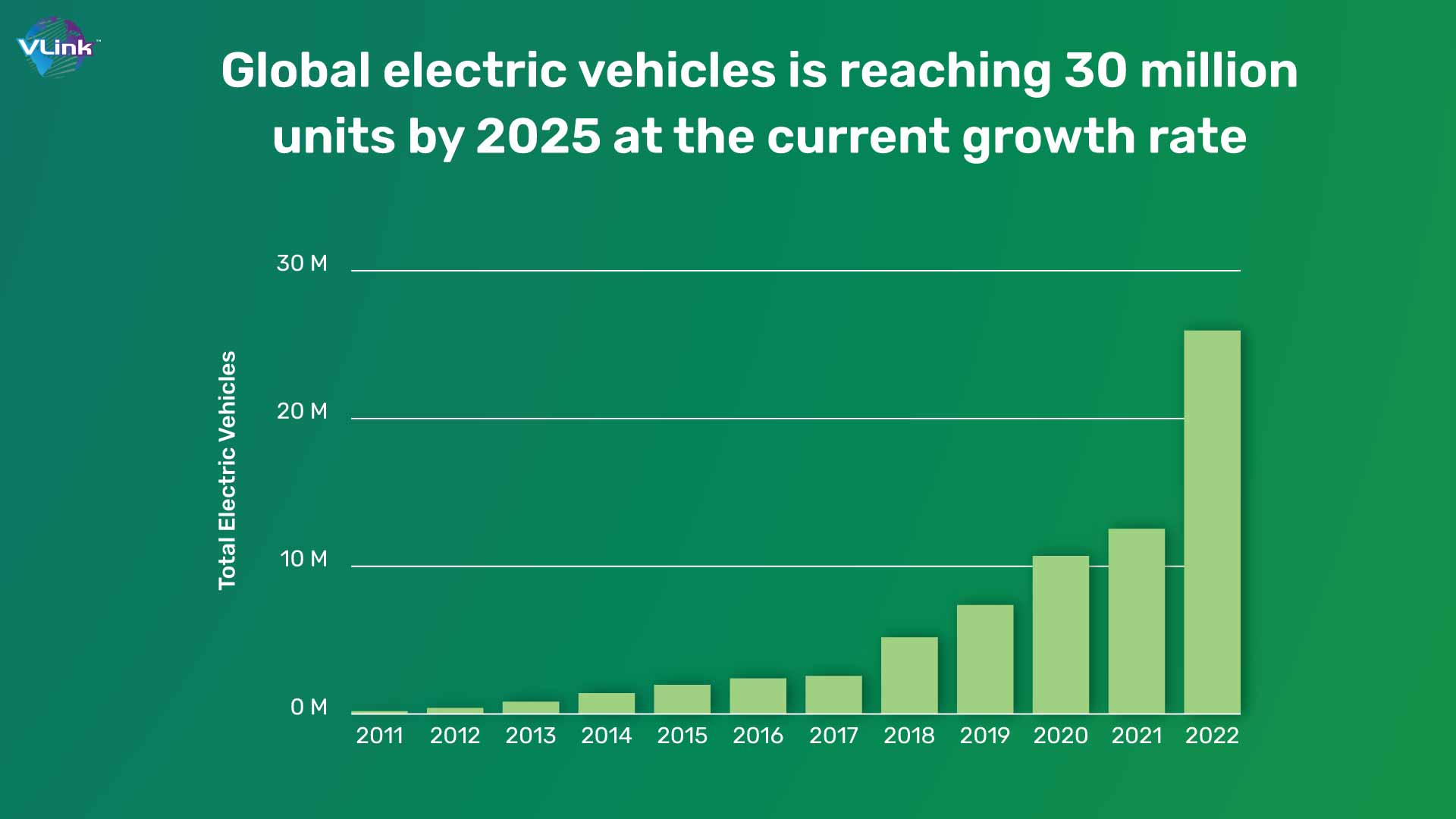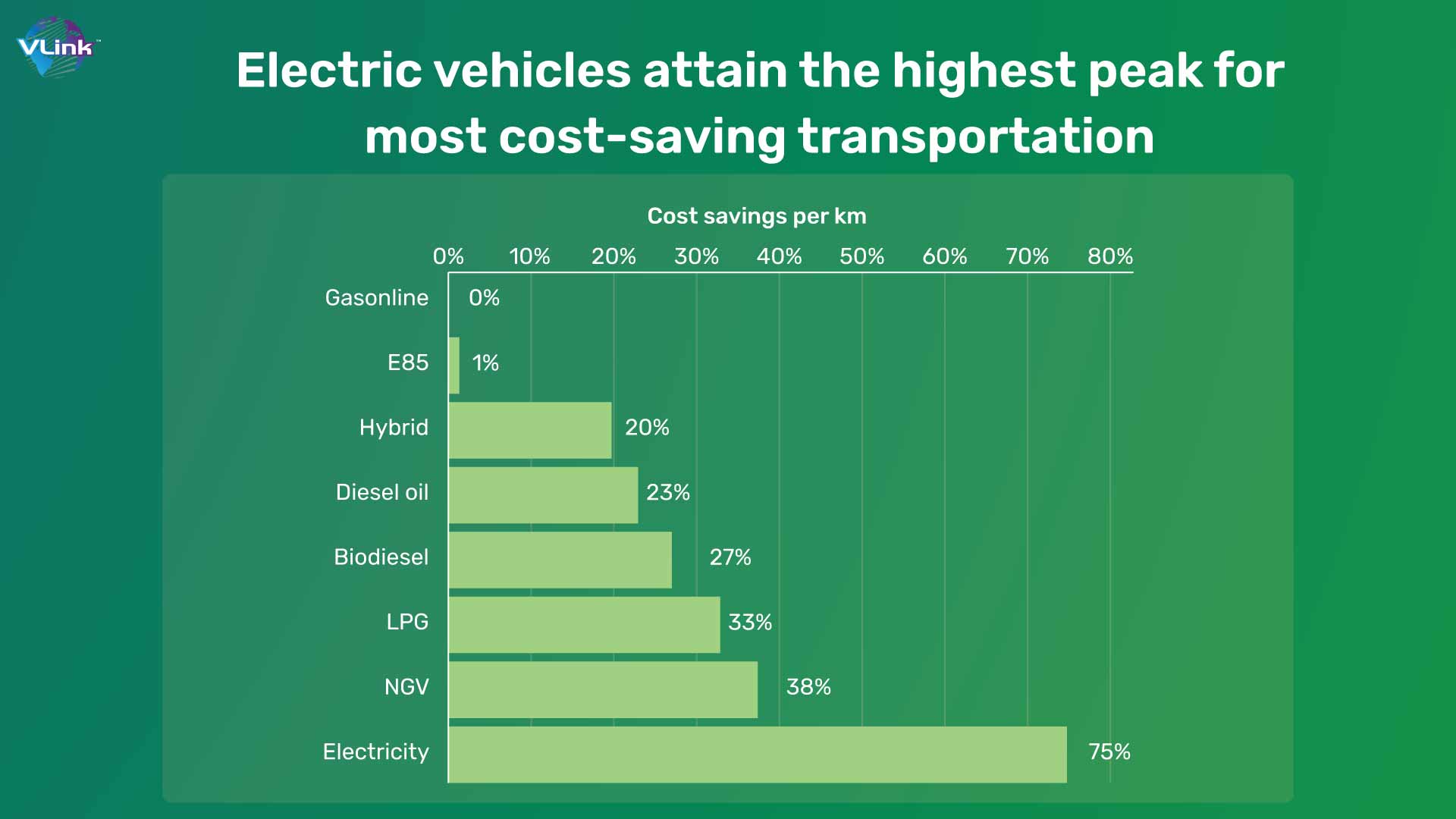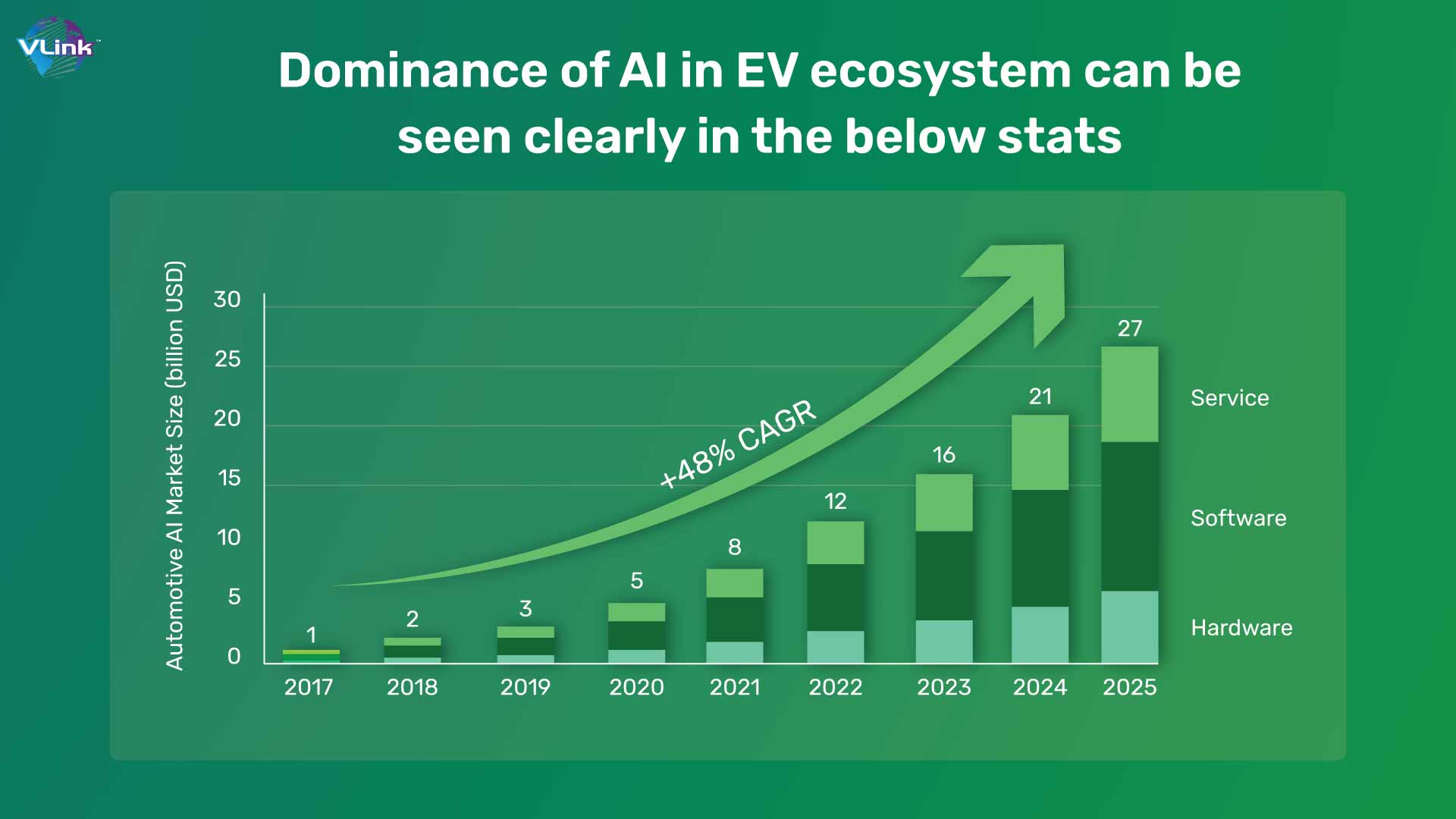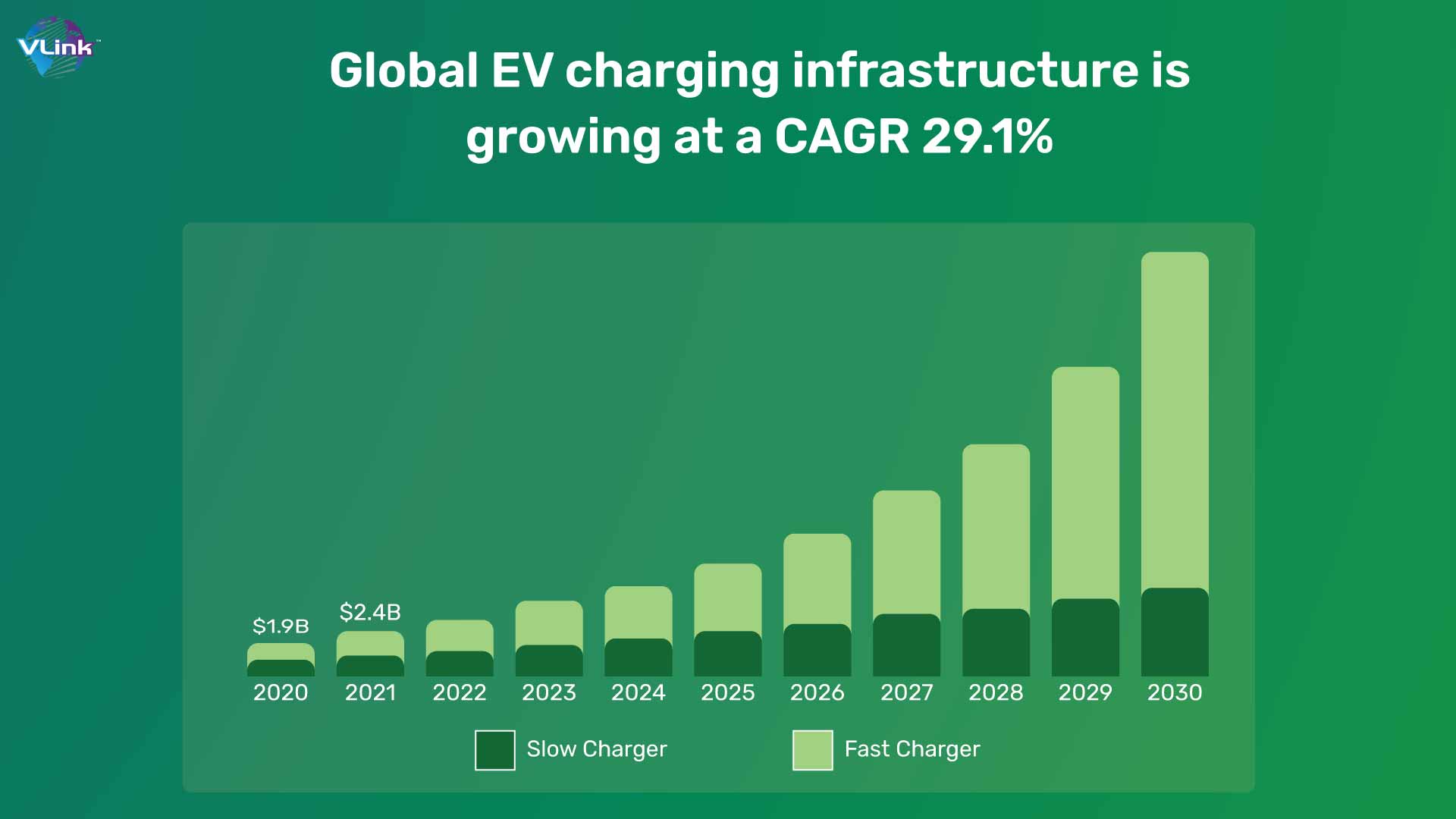In recent times, there has been a momentous transition towards a future that prioritizes sustainability and environmental consciousness. This paradigm shift can be predominantly attributed to the harmonious interplay of Artificial Intelligence (AI) and Electric Vehicles (EVs).
In a world where the electric vehicle (EV) industry is rapidly proliferating, the demand for electricity and the requisite infrastructure is experiencing a remarkable upsurge. Projections indicate that this demand will surge by a staggering 60% from the year 2019 to 2050, exerting immense pressure on various facets of power management, including electricity generation, transmission, commerce, and dissemination.
The undeniable shift towards electric vehicles is driven by burgeoning concerns surrounding environmental preservation and the imperative to mitigate greenhouse gas emissions. Consequently, an increasing number of consumers are embracing EVs, not only reducing our ecological footprint but also giving rise to a plethora of challenges and prospects within the realm of energy sustainability.
 As these two technological advancements continue to evolve and intertwine, they are playing a pivotal role in driving the green revolution.
As these two technological advancements continue to evolve and intertwine, they are playing a pivotal role in driving the green revolution.
This article delves into the profound impact of AI and EVs on environmental sustainability and explores the exciting prospects they offer for a cleaner, greener future.
The Convergence of AI and EVs
With the exponential growth of EVs, the demand for electricity to power these vehicles is skyrocketing. Charging stations are mushrooming across the globe, trying to keep up with this surge. But how can power generation and distribution systems keep pace with this rapidly escalating demand?
Artificial intelligence and EVs, seemingly distinct technologies, are converging to revolutionize the automotive industry and beyond. AI, with its ability to process massive amounts of data and make intelligent decisions, has found a natural home in EVs. This collaboration between AI and EVs is leading to a range of benefits that extend far beyond the road.
Artificial Intelligence is not just about futuristic robots; it is significantly altering how we manage our energy resources. AI has the capability to make precise predictions about the charging behavior and requirements of future EV users. By analyzing data from charging stations and user behavior, AI can assist charging station operators in maximizing their business strategies and optimizing their resources.
Role of AI in EV industrial growth
Artificial Intelligence is the driving force behind many of the breakthroughs in Electric Vehicle technology. Here are some keyways in which AI is shaping the future of EVs:
Maximizing Profits
For charging station operators, AI can be a financial boon. By using AI-driven predictions and data analysis, they can optimize their business hours, ensuring that they have staff and resources available when demand is at its peak. This not only increases profits but also contributes to a better overall charging experience for users.

Predictive Charging
Imagine a world where EV charging stations know when you are likely to charge your vehicle. AI can predict your charging needs based on your daily routine, ensuring that charging stations are ready to serve you at the right time. This level of efficiency minimizes waiting times and ensures that the charging experience is convenient and user-friendly.
Managing Energy Better
AI doesn't just stop at predicting your charging needs; it can also help in managing energy more effectively. By analyzing the energy grid's status, AI can distribute power intelligently, reducing peak loads and minimizing the strain on power generation systems.
This not only ensures uninterrupted service but also reduces energy wastage, benefiting both the consumer and the environment.
Enhancing Driver Assistance Systems
AI powers advanced driver-assistance systems (ADAS) in EVs, making them safer and more autonomous. Features like adaptive cruise control, lane-keeping, and automated emergency braking rely on AI to provide a safer driving experience.
Research and Development
AI plays a significant role in EV research and development. It aids in the simulation and analysis of various materials, contributing to the development of more efficient and eco-friendly batteries and energy storage solutions.
Market Insights
AI is used to analyze vast amounts of data related to EV adoption, usage patterns, and market technology trends. This data-driven approach helps manufacturers and policymakers make informed decisions, leading to a more efficient and growth-oriented EV industry.
How is AI & EV driving green transportation?
The development of AI-driven charging infrastructure is a game-changer for EVs. Here's how:
Smart Charging Stations
AI helps in the efficient management of charging stations, ensuring that they are used optimally and reducing energy wastage. Technology ensures where and when it's needed. This will also reduce waiting times for EV owners, prevent vehicle logging at stations.
AI-Powered Battery Management
One of the primary areas where AI is making its mark in EVs is in battery management. The battery is the heart of an electric vehicle, and how efficiently it operates greatly impacts the overall performance and sustainability of the EV.

Route Optimization
AI can plan routes that include charging stops, considering factors like traffic, weather, and battery range. This minimizes charging time and energy consumption. By integrating GPS technology, it can help you recognize nearby EV charging stations during travel.
Renewable Energy
AI is being used to optimize the operation of wind and solar farms, ensuring that clean energy is harnessed to its full potential. AI in EV is improving waste sorting and recycling processes, reducing the environmental impact of waste disposal.
Autonomous Driving
One of the most exciting developments in the integration of AI in EVs is the advent of autonomous driving. AI algorithms, along with a network of sensors, cameras, and radar, enable EVs to drive autonomously.
Reduced Carbon Footprint
The combined efforts of AI and EVs will lead to a significant reduction in the carbon footprint of transportation, making our cities cleaner and more livable. Moreover, AI algorithms are making ridesharing and carpooling more efficient, reducing the number of vehicles on the road and the overall carbon footprint.
Economic Advantages
EVs and AI-driven technologies are creating economic opportunities by spurring innovation and creating jobs in the green tech sector.
Sustainable Transportation
AI is a key enabler of sustainable transportation. With autonomous driving, ridesharing, and more efficient EVs, we can envision a future where our transportation systems are not only environmentally friendly but also economically viable.
AI + EV: What does the future hold?
The future of AI and Electric Vehicles (EVs) holds tremendous promise and innovation. As technology continues to advance, we can anticipate several exciting developments in the intersection of AI and EVs:
Charging Infrastructure
AI will transform how we interact with charging stations. Predictive analytics will enable EVs and charging stations to communicate, ensuring that your vehicle is charged when you need it. This convenience will encourage more people to adopt EVs, knowing that charging will be hassle-free. 
Battery Technology
AI will aid in the development of next-generation batteries. By simulating and analyzing various materials and structures, AI can help create more powerful, longer lasting, and environmentally friendly batteries. This will reduce charging times and make EVs even more competitive with traditional vehicles.
Smart Grid Integration
The integration of EVs into the smart grid will be seamless with AI's assistance. EVs will not only draw power from the grid but also feed excess energy back, creating a more balanced and sustainable energy ecosystem.
User Experience
AI-driven infotainment and UI/UX design systems in EVs will provide a personalized and intuitive driving experience. Voice recognition, predictive maintenance, and real-time traffic updates are just a few examples of how AI will enhance the overall driving experience.
Predictive Maintenance
AI's predictive capabilities are a game-changer in vehicle maintenance. AI-driven systems can predict when EV components are likely to fail, allowing for proactive maintenance. This not only enhances safety but also reduces the environmental impact of repairs, as it prevents unexpected breakdowns and the need for additional parts.
Enhancing Energy Efficiency
AI helps in optimizing the energy consumption of the EV. Through real-time analysis of driving conditions, traffic, and weather, it adjusts power usage to maximize efficiency. This not only increases driving range but also minimizes the carbon footprint.
Intelligent Traffic Management
AI is not limited to just autonomous vehicles; it can also play a critical role in managing traditional traffic. Smart traffic management systems powered by AI can coordinate traffic flow, reduce congestion, and minimize idling. This not only reduces fuel consumption but also lowers emissions, contributing to cleaner air and a healthier environment.
The future of AI and EVs is marked by a mutually beneficial relationship. AI will continue to enhance the efficiency, convenience, and environmental sustainability of electric vehicles. As technology evolves, we can expect a world where EVs are the norm, and transportation is not only cleaner but also more enjoyable and accessible than ever before.
VLink’s approach towards AI-integrated EV ecosystem
The formidable combination of AI and EVs is propelling us toward a future that prioritizes sustainability and environmental friendliness. By enhancing the efficiency of electric vehicles and ushering in a transportation revolution, these innovations serve as pivotal catalysts in the much-needed green transformation.
As we persist in harnessing the potential of AI and EVs, we can anticipate a world with less carbon emissions with greener transportation for the well-being of future generations. The incorporation of AI into Electric Vehicles stands as a significant stride toward a more sustainable and environmentally conscious future.
VLink looks this as a great way to help vehicle manufacturing industries with digital technologies like AI, by offering innovative solutions. From integrating the smart algorithms to implement data analytics solutions, our experts can bring beneficial impacts to the ways EVs are being utilized. So, just partner with us, discuss your idea to explore more opportunities towards greener transportation and bring your automobile business along the way.
Frequently Asked Questions
Artificial intelligence takes on the formidable task of analyzing intricate patterns within usage data to make insightful predictions regarding the impending depletion of an electric vehicle's battery and its potential whereabouts at that juncture. This profound analysis empowers the optimization of routes towards charging stations, mitigating the imminent risk of an unexpected power depletion.
In the future of electric vehicles (EVs), artificial intelligence (AI) is poised to play a monumental role. AI is currently in the process of revolutionizing and enhancing performance, advancing safety features, and optimizing fleet efficiency within the realm of EVs. However, it's crucial to understand that this transformative journey is only in its nascent stages.
The profound influence of AI is conspicuously evident in the widespread adoption of electric vehicles (EVs), making it one of the most conspicuous domains where AI's impact is felt. As the world gravitates towards sustainable transportation solutions, AI stands as an indispensable tool, addressing critical challenges and expediting the transition to electric mobility.







